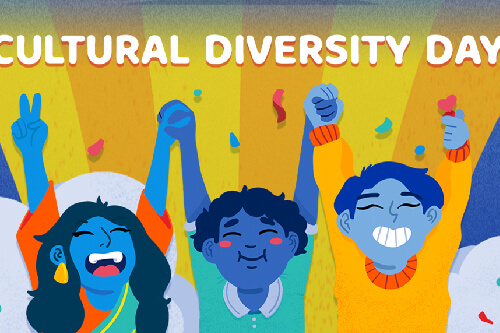
Message from Ms. Audrey Azoulay, Director-General of UNESCO, on the Occasion of World Day for Cultural Diversity for Dialogue and Development文章源自英文巴士-https://www.en84.com/11392.html
教科文组织总干事奥德蕾·阿祖莱世界文化多样性促进对话和发展日致辞文章源自英文巴士-https://www.en84.com/11392.html
文章源自英文巴士-https://www.en84.com/11392.html
21 May 2021文章源自英文巴士-https://www.en84.com/11392.html
2021年5月21日文章源自英文巴士-https://www.en84.com/11392.html
文章源自英文巴士-https://www.en84.com/11392.html
This World Day is an opportunity to celebrate the strength and resilience of cultural diversity in particularly critical times.文章源自英文巴士-https://www.en84.com/11392.html
文章源自英文巴士-https://www.en84.com/11392.html
值此世界文化多样性促进对话和发展日,我们正应强调文化多样性在关键时刻的力量和韧性。文章源自英文巴士-https://www.en84.com/11392.html
文章源自英文巴士-https://www.en84.com/11392.html
For more than a year, the COVID-19 crisis has precipitated a cultural diversity crisis. The closure of museums and world heritage sites and the cancellation of festivals, concerts and ceremonies have plunged the world of culture into a distressing state of uncertainty, threatening in particular independent creators, who are the lifeblood of cultural diversity.
一年多以来,疫情危机带来了文化多样性的危机。博物馆和世界遗产地的关闭以及各种节日、音乐会、庆典的取消,让文化界陷入极为不确定的状态,而作为文化多样性命脉的独立创作者尤其面临威胁。
Internet might have seemed a necessary solution, but not a sufficient one, because digital technology reproduces, amplifies or creates new inequalities, running the risk of cultural homogenization. When online presence concerns only 5% of African museums, and by its very nature is incompatible with the ceremonies of our intangible heritage, the diversity of our world suffers.
互联网似乎是一种必要的后备解决方案,却不足以解决问题。数字技术会复制、扩大或造成新的不平等,带来文化单一化的风险。仅有5%的非洲博物馆拥有线上渠道,且就本质而言,线上方式与非物质遗产活动不相匹配,世界的多样性因此而受到损害。
Moreover, the effects of the COVID-19 pandemic are likely to be structural, not merely cyclical. With one museum in eight that may never reopen and 12% of artists considering leaving the cultural sector, for example, cultural diversity in its entirety is under long-term threat.
此外,疫情的影响可能是结构性的,而非暂时性的。例如,八分之一的博物馆可能永久闭馆,12%的艺术家考虑退出文化行业,文化多样性整体受到长期威胁。
Yet we need cultural diversity more than ever; we need to look at the world from different perspectives. The pandemic has also reminded us of the extent to which culture is a common good, opening up horizons and providing our societies with connection and meaning, making them less solitary and more inclusive.
然而,我们比以往任何时候都更加需要文化多样性,更加需要以不同的视角来看待世界。因为疫情也提醒着我们,文化是一种共同财产,它能开阔视野,为我们的社会建立纽带,赋予其意义,使社会少一些孤独,多一份团结。
That is why we must help it to recover, in all its strength and diversity.
因此,我们必须助力文化再次前行,以其多样的形态全力发展。
This implies the need for a cultural “New Deal” based on the views of professionals. UNESCO has made this possible through its ResiliArt debates: more than 270 discussions have taken place in 110 countries, including 25 in Africa.
这意味着从文化从业者的感受出发,重新打造文化“新政”。这正是教科文组织“坚韧艺术”的讨论所带来的成果:在110个国家举行了270多场讨论,其中包括在非洲举行的25场。
They have put forward shared recommendations to create a more protective status for artists, reduce gender and geographical inequalities and ensure a fair distribution of income between platforms and creators. The ideas are abundant, and this International Year of Creative Economy for Sustainable Development provides an ideal opportunity to implement them.
通过这些讨论,提出了一些共同的建议:为艺术家创设更具保护性的地位,减少性别和地域不平等,并确保平台和创作者之间公平分配收入。各种想法层出不穷,而今年这一国际创意经济促进可持续发展年正是落实这些想法的理想时机。
As Claude Lévi-Strauss said, “the diversity of cultures is behind us, around us and in front of us”. We must therefore stay the course and forge ahead.
正如克洛德·列维-斯特劳斯所言:“文化多样性就在我们的身边。”所以,让我们不要迷失方向,奋力前行吧。

